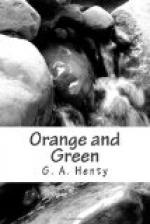He himself was by no means sanguine as to his position. The Irish army was still as numerous as the British, and they were not discouraged by their defeat at Aughrim, where they considered, and rightly, that victory had only been snatched from their grasp by an accident. Ginckle relied rather upon concession than force. The Irish were divided into two parties, one of which earnestly desired peace, if they could obtain fair terms, while the other insisted that the British could not be trusted to keep any terms they might make. Sarsfield was at the head of the war party, and succeeded, for the present, in preventing any arrangement.
Ginckle advanced slowly, for he had to march through a waste and desolate country. Sarsfield, with his cavalry, hovered round him, and intercepted his communications, and he was so short of draught horses that it was only by forcing the gentry of Dublin to give up their carriage horses, for the use of the army, that he was enabled to move forward.
It was not until the end of August that he sat down with his siege train in front of Limerick, and prepared for the siege. For the moment, the party in favour of peace among the Irish had been silenced by the news that twenty large ships of war, with a great number of transport and store ships, were being pushed forward at Brest and other French ports to come to their assistance.
Ginckle occupied the same ground which William’s army had taken up in the first siege, but directed his attacks chiefly upon the English town. As before, the Irish communication was open with the county of Clare, and the seventeen regiments of Irish horse were encamped on the Clare side of the river. Ginckle pushed on his works with great vigour, and the duty in the trenches was so severe, that the cavalry were compelled to take their turn with the infantry; but, notwithstanding that the siege artillery was much more powerful than that which William had at his disposal, but little progress was made. The town was set on fire several times; but the flames were speedily extinguished, and, as the inhabitants had all left the city and erected tents on the Clare side, under the protection of their cavalry, little harm was done to them.
While the siege was going on, a number of desultory engagements took place, in different parts of the country, between the Protestant militia which had been lately raised, and the bands of rapparees, with varying success.
The season was getting late. Ginckle was again becoming straitened for provisions, for the proclamations which he issued failed to inspire the peasantry with any confidence. He now erected a battery, of thirty-five guns, against King’s Island; and, after an incessant cannonade of some days, a breach was effected in the wall between the abbey and Ballsbridge. Preparations were made for crossing the arm of the Shannon and assaulting the breach; but the works constructed for crossing the river were repeatedly destroyed by the Irish, and the idea of assault upon the breach was, at length, abandoned. So desperate did Ginckle now think his position, that he issued orders for the repair of the fortifications of Kilmallock, intending to raise the siege and establish his winter quarters there; but he postponed taking this step for a few days, for to do so would be to bring almost certain disaster upon his army.




